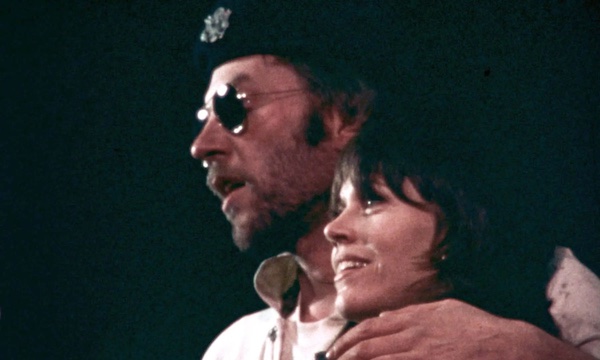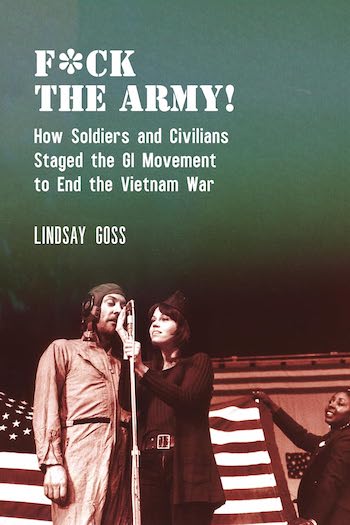Book review: “F*CK The Army” – anti-war entertainment

By Bill Littlefield
The rotating cast of the FTA roadshow was determined to reinforce military personnel’s belief that the Vietnam War was, at best, senseless and, at worst, criminal, insane and murderous.
F*CK The Army: How soldiers and civilians started the GI movement to end the Vietnam War by Lindsay Goss. New York University Press, 240 pages. Hardcover, $89, paperback, $30.
 Officially, the letters FTA stood for Free Theater Associates. The organization’s traveling entertainers included Peter Boyle, the late Donald Sutherland and Jane Fonda, among others. Unofficially, participants, audiences and anyone else familiar with the group and its sketches and musical numbers knew what the initials really stood for – “Fuck the Army.”
Officially, the letters FTA stood for Free Theater Associates. The organization’s traveling entertainers included Peter Boyle, the late Donald Sutherland and Jane Fonda, among others. Unofficially, participants, audiences and anyone else familiar with the group and its sketches and musical numbers knew what the initials really stood for – “Fuck the Army.”
Reading about Free Theater Associates performances over 50 years ago brought back memories of the escalating days of the Vietnam War. I was told that anyone who had an FTA tattoo on their draft board would not be drafted. I have no idea if that was true.
As author, “theatermaker, cultural historian, and performance theorist” Lindsay Goss reports, “at first glance, the FTA seems to reinforce the persistent perception of the antiwar movement during Vietnam as ‘anti-soldier,'” but “the show was an act of solidarity—a civilian-led effort to support the growing number of service members who were fed up with the war and increasingly inclined to organize against it from within their own ranks.” Sutherland, Fonda, and the rotating cast of the FTA roadshow were determined to reinforce service members’ beliefs that the war was senseless at best and criminally insane and murderous at worst.
One of the anecdotes Goss includes in her story shows the connection some of the soldiers felt with what the FTA was trying to accomplish. WashingtonPost A reporter in Vietnam was approached by a young soldier with a gruesome photograph of a murdered and mutilated Vietnamese woman. “I’ve seen much worse,” the soldier tells the reporter. “They told me this woman was just running across a field. Do you think I should show this to Jane? I think she should see it, she’s a woman, she should know about it.”
From another revealing passage, we learn that Fonda, unlike previous entertainers who were sent to the front for propaganda purposes, had a lot of contact with the other side. Goss describes an incident in which the actress crouched in a trench with her Vietnamese guide and a local student while American planes dropped bombs all around them. When the attack was over and the three women emerged from their hole, Fonda heard herself saying over and over, “I’m so sorry, oh, I’m so sorry, I’m so sorry.” The guide calmly interrupted her and translated the student’s response: “You shouldn’t cry for us. We know why we’re fighting. The grief should be for your country and your soldiers. They don’t know why they’re fighting us.”
The late Donald Sutherland and Jane Fonda in the agitprop documentary FTA from 1972. Photo: Kino Lorber
According to Goss, on their most exciting days, FTA members believed that their antiwar efforts were making a significant difference. That may have been true. For whatever reasons, the number of soldiers and sailors who opposed the bloody work they had been sent to Vietnam to do was increasing. Protests within their own ranks were growing and becoming louder. Sometimes soldiers sabotaged their own missions and even shot or threatened to shoot the officers who had given them orders they considered ill-advised or unduly dangerous. The act of rebellion was called “fragging,” after the fragmentation grenades the soldiers carried. Suicides within the military were not uncommon, and desertions were on the rise. “A 1972 study found that ‘volunteer soldiers were more likely to defect from the force without permission than conscripts.'”
The subject of F*CK The Army guarantees that the book contains plenty of drama. Unfortunately, Goss’s style is oddly flat at times. She writes like a scientist with an audience of fellow scientists in mind. Some readers will not be receptive to the message because they find the book pedantic, and that is unfortunate, because the more that is learned about schemes like FTA, the more likely it is that America can avoid another mad military rampage.
Bill LittlefieldThe latest novel is compassion (Black Rose lettering).



